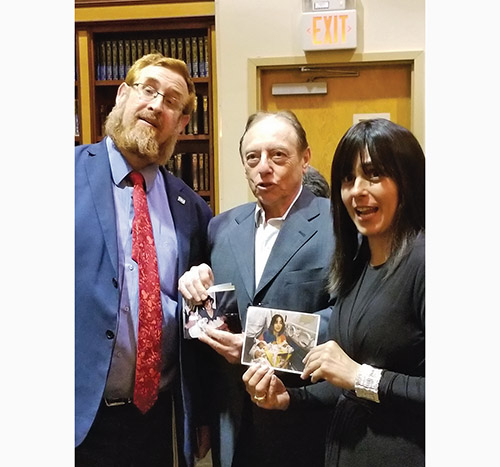

Rabbi Yehuda Glick carries a two-sided business card. On one side he is identified as a member of Knesset from the Likud Party, a role he has served in for the past two years. On the flip side, his name appears accompanied by the Hebrew phrase “Yerushalayim Shel Shalom,” Jerusalem of Peace. “You may identify me with my zealotry regarding the Jewish right and privilege to ascend the Temple Mount and my near-fatal shooting as a result of this agenda. What you may not know about me is that I am equally passionate about bridging the gap between the many different ethnic and religious groups that populate our beloved state of Israel today. That is why I am accompanying Hinam on their current visit to the US,” said Rabbi Glick.
Rabbi Glick and Hinam Founder and Director Yaron Kanner brought their panel of 13 Israeli citizens to the Young Israel of Teaneck on Tuesday evening, May 8, to spread their vision. Rabbi Glick explained, “The Hinam Center for Social Tolerance has as its mission to serve as a hothouse for the development of initiatives that foster dialogue between various sectors of Israeli society. The guiding principle for the Center’s initiatives is ‘the promotion of unmediated, long-term and meaningful familiarization with the Other.’”
The Hinam Center for Social Tolerance, an outgrowth of Gesher, is a non-political and nonsectarian organization that promotes tolerance and respect within Israeli society through arranging significant encounters between various sectors of Israeli society. Participants, who include members of secular, religious-Zionist and Charedi communities, as well as Israeli Arabs, Bedouins, Ethiopians and settlers, are brought together for trips that span a day or a week, in an effort to expose them to communities and ways of life different from their own. They live temporarily in alien settings such as an Arab village, a settlement or an Ethiopian ghetto, during which time they engage in direct meetings with members of the host community, learn about each other’s lives and begin to see reality through the eyes of the Other.
Hinam’s diverse activities cater to different age groups at different stages within Israeli society. For children and adolescents, school trips are planned to communities outside the students’ home environment. For pre-military mechina groups, national service volunteers, college students and soldiers, hikes and other opportunities are arranged through the Achi Yisraeli project. For adults, trips of several days are offered and include residing in diverse communities.
Rabbi Binyamin Krohn, rabbi of the Young Israel of Teaneck, was intrigued when approached to host Hinam’s adult program during their 10-day tour in the US to spread their mission. After extensive research, Rabbi Krohn agreed and opened the program up to his shul community. Members of the shul, and in particular the Hod family, graciously opened up their home to the diverse group whose individuals expressed sincere gratitude for the hospitality and warmth shown to them at the Hod residence.
In introducing the program, Rabbi Krohn quoted the Biblical verse “Ve’ahavta l’re’acha ka’mocha,” found in the week’s Torah portion of Kedoshim, as so aptly describing the program. According to the Ramban, the phrase should be taken to mean that a person should desire for others exactly what he desires for himself—no less.
The diverse group, accompanied by Deputy Director Tzofit Elitzur of Maale Adumim, was introduced to the audience by Yaron Kanner, followed by Rabbi Glick who introduced each presenter for brief remarks and served as English translator as needed.
The group consisted of highly educated individuals, each with a specific rationale for joining this trip promoting sovlanut, tolerance, within Israel’s diverse population.
Participants included Noa Beer, a secular mother of two from Ramat Hasharon, who serves as a consultant to the Ministry of Economy and social activist on behalf of Women’s Spirit, a nonprofit promoting economic independence. Zainab Abu Sweid, hailing from a Bedouin village in the Galil, also a mother of two, is a national supervisor of national civil service by Arab youth and a social activist for promoting disadvantaged populations. Orly Shavit, a dati-leumi mother of three from Ramat Ha’sharon, is a special education teacher and member of a local women’s council. Yosef Elamour, from a Bedouin village in the Negev, father of three, is founder and CEO of LANA, a nonprofit for the promotion of education and welfare in Arab society. Avi Farkash, graduate of the dati-leumi school system and a Reserve Intelligence Officer, practices law in Tel Aviv and spent time at SAR as a shaliach. Yael Mizrachi, mother of 11, including the first naturally born quadruplets in Israel, is a Charedi publicist for several media channels and worked in the Office of the Minister for Senior Citizens. Itamar Kea Levi is a Sephardic Charedi, married to a Gerer Chasida, father of two, active in Eli, an organization bringing together people of different identities and introducing them to the Charedi community. Finally, Meny Isso, of Ashkelon, who emigrated from Ethiopia in 1991, is chairman and owner of the Maccabi Ashkelon soccer team.
Each presenter in turn expressed appreciation for the opportunity to gain genuine understanding and form sincere friendships with the others in the group. Upon their return to Israel, they hope to remain in contact and “contribute to the creation of a society where hatred and fear will be overcome by humanity and tolerance.”
To learn more about Hinam and its various projects, visit www.hinam.org.
By Pearl Markovitz













